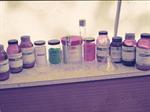Develop a Basis for Working in Applied Science
 Study in your own time and at your own pace
Study in your own time and at your own pace- Learn more about science
- Study a specially designed course to meet your needs
- Written and taught by highly experienced tutors
HOW THE COURSE IS STRUCTURED
- At least three modules should be taken from Group 1.
- Take a further two from Group 2 options, and
- the remainder from either Group.
Click on modules below for more details.
Group 1
Group 2
What you learn through ACS Applied Science Studies
 An ACS Certificate or Diploma in Applied Science is designed to provide foundation knowledge beyond secondary education, but with a greater relevance to the practical workplace than academic type university studies.
An ACS Certificate or Diploma in Applied Science is designed to provide foundation knowledge beyond secondary education, but with a greater relevance to the practical workplace than academic type university studies.
Our qualifications can also be used to bridge the gap between a specific qualification and the needs of a certain position.
- For example, whilst an irrigation equipment salesperson might be qualified in sales, they might choose to study a Certificate in Applied Science with a major in horticulture to give them that “foundation knowledge” that will allow them to answer those difficult questions from clients.
- A qualified nurse might take a Certificate in Applied Science with a major in nutrition to increase their ability to advise patients on dietary changes as part of an overall treatment program.
Employment Opportunities
Getting a job in today’s world is determined not only by the sort of qualification you have, but also your personality, presentation, attitude, experience, interests, and ability to adapt to new challenges.
With an ACS qualification in Applied Science, you are better prepared to enter a science oriented workplace, learn faster on the job, and become a more useful employee within a shorter period of time.
There are in fact fewer jobs today (per capita) that require a degree than there were in the past. Despite this, today more than in the past, employers do tend to seek certain specific knowledge and skills in employees.
What do Employers Think?
A qualification that has required hard work to attain will be an indication to an employer that you have a certain level of drive and commitment.
An understanding of the industry and discipline which the job encompasses will indicate that you are more likely to learn faster and become useful to the employer sooner. We design our courses with these things in mind.
Where Might a Certificate or Diploma Lead?
- Certificates may lead you initially to being an “assistant” of some kind. Whilst it varies, assistants in the field of science might become employed as laboratory assistants and technical assistants.
- Diplomas may generally offer the possibility of an initial position of greater responsibility (although some diploma graduates might never move beyond an assistant position). People with Diplomas might become Technical Officers, Technical Advisors, Freelance Consultants (in some fields), and Technical Sales Managers.
- If you complete a certificate first, you may then apply to continue studies toward advanced diploma, and credit will be awarded for modules already passed in your certificate.
- Whatever the qualification though; it is important to understand that the world of employment has been changing and is continuing to change; and employment opportunities are increasingly in self employment, either as a freelance contractor, or running your own business. Scientists with longer term career prospects will not necessarily be those with diplomas, degrees or higher level qualifications. Increasingly, people who succeed are those who know the science, see opportunities, and apply scientific knowledge to take advantage of those opportunities.
You need more than just science - you need to also know how to apply it.
This is where this course offers you possibilities that may well give you an advantage over graduates with much higher level qualifications in science
WHAT NEXT?
Register to Study - Go to “It’s Easy to Enrol” box at the top of the page and you can enrol now.
or
Get Advice – Email us at info@acsedu.co.uk OR
Use our FREE COUNSELLING SERVICE to contact a tutor
CLICK TO CONTACT US